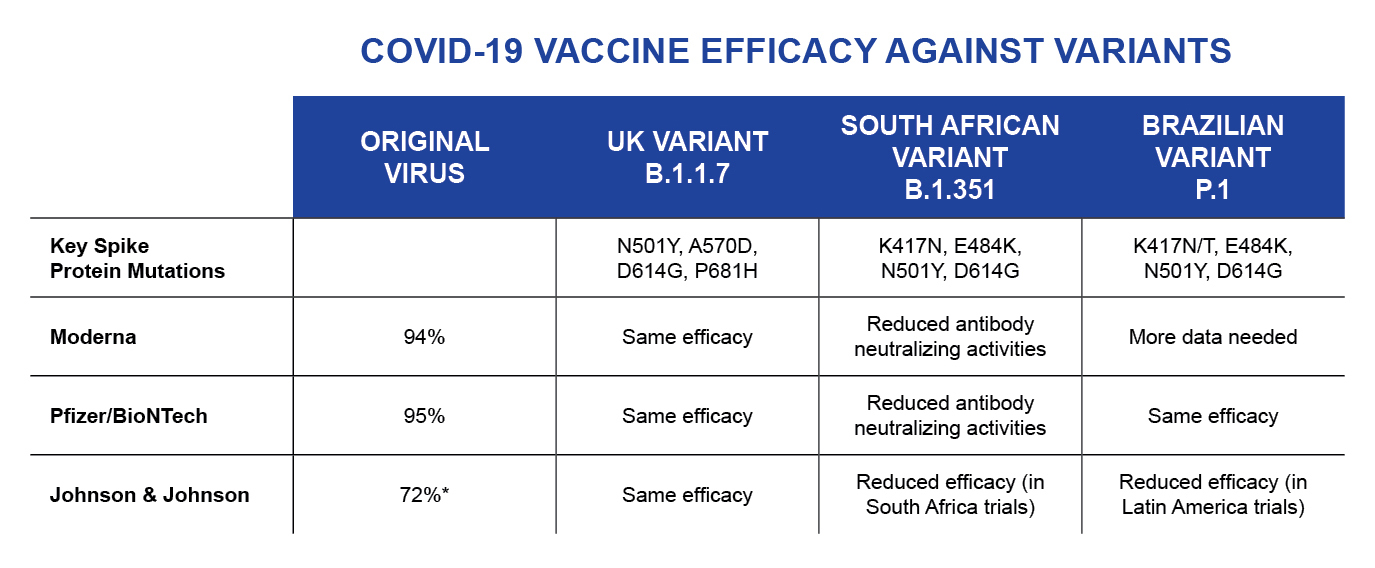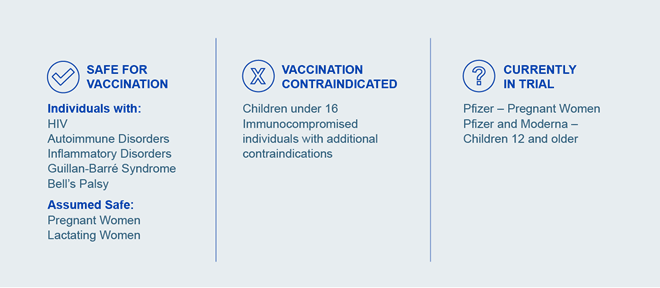On February 24th, CAS in partnership with ACS, hosted a webinar with vaccine experts. During the hour-long session, over 120 questions were submitted by participants, and unfortunately we weren’t able to answer many of them in the time available. With the recent U.S. approval of the Johnson & Johnson COVID-19 vaccine, many questions centered on the safety, efficacy, and composition of the different available vaccines. Given the high interest, herein I will address the most common COVID-19 vaccine-related questions and synthesize the current research so people can make well-informed decisions.
Unlike Moderna and Pfizer/BioNTech’s mRNA vaccines, Johnson & Johnson’s COVID-19 vaccine is a single dose viral vector vaccine and can be stored at a normal refrigerator temperature. The non-replicating viral vector delivery system means that a harmless virus (Adenovirus26) is used to carry a genetic code to our cells with the directions to produce the antigenic spike proteins (Janssen Biotech, 2021).
While both types of vaccines deliver our cells' instructions to begin recognizing the spike protein of SARS-CoV-2 and training our immune army to combat the actual virus, the mRNA vaccines require two doses. In contrast, the Johnson & Johnson vaccine is a single dose, which would significantly simplify and speedup the vaccination process. Another advantage for the Johnson & Johnson vaccine is that it can be stored at routine refrigeration temperatures, which makes this vaccine easier to be accessed by rural or undeveloped regions comparing with mRNA vaccines.
The Johnson & Johnson vaccine was 72% effective at preventing COVID-19 infection, which is lower than the reported 95% for the Pfizer/BioNTech and Moderna vaccines. Still, the Johnson & Johnson vaccine is the only one tested against the South African variant, potentially contributing to the lower reported efficacy (Janssen Biotech, 2021). We will discuss variants later in this blog post.

To directly address the question of which vaccine you should take, the answer is YES! As we begin to apply our critical lens to evaluate each vaccine's benefits and risks, the ultimate goal can be lost in the oversaturation of information. The simple fact is we have three viable and safe vaccines that are highly effective (nearly 100%) at preventing severe disease and death related to COVID-19; valuing human life is more important than the variable efficacy rates that were determined on differing criteria in a laboratory setting. Dr. Anthony Fauci, White House Chief Medical Advisor, recommends taking whichever vaccine is available when you become eligible (Newburger, 2021).
Viral variants are defined by an accumulation of mutations in the virus's genetic code that begins to diverge from the original identified genetic composition. While some protection has been shown for the U.K. variant (see below), the good news is that modifying the existing vaccines with these new genetic sequences will likely be much faster than developing the original vaccine. Today’s approved vaccines are critical in protecting people from the most common strains, but unfortunately it will still be important for people to socially distance and wear masks to minimize the spread of new variants before boosters are approved.
The current vaccines target sequences of spike proteins on the surface of the SARS-CoV-2 coronavirus. When this spike protein mutates significantly, new variants are created and can be spread quickly. Specific amino acid mutations for each variant are listed in the table below.
The U.K. variant (B.1.1.7), which emerged in south east England in September of 2020, spread quickly to more than 50 countries. This rapid spread was likely due to the suspected increased virulence and transmissibility of this variant. The good news is this variant was recognized by the Moderna and Pfizer/BioNTech vaccines, which means individuals that have been vaccinated have the same protection against developing severe disease from the U.K. variant as they do with the original SARS-CoV-2 virus (Wang et al., 2021).
The South African variant (B.1.351) was identified in late 2020 and is characterized by a mutation in the spike protein that affects the receptor binding domain. In contrast to the U.K. variant, the South African variant was not well neutralized by the immune responses stimulated by currently available vaccines. This evidence supports the need to develop vaccine boosters to account for these mutations and the rapidly evolving nature of the viral genetic code in the vaccinated population and tweaks to the genetic sequences in the vaccines slated for initial inoculation (Tegally et al., 2020).
The Brazilian variant (P.1) is rapidly emerging in Brazil and shows similar mutations to the South African variant. This implies this variant also escapes the current mRNA vaccines' protective effects (Tegally et al., 2020).
While these are the most prominent variants identified, more variants are emerging (i.e., California, New York). Mutation is a survival strategy for viral pathogens; we must constantly monitor these mutations and adjust our vaccines accordingly to provide effective vaccines. Additional information regarding the current vaccines’ effectiveness against these variants can be found here.

Inadequate hospitalization and death data on children related to COVID-19 led to initial perceptions that children were not affected by the coronavirus pandemic. The fact is, there is a substantial burden of hospitalizations in children. Through October 2020, 127 children died due to coronavirus-related disease (Anderson et al., 2020). Another compounding fact to this initial misconception is that symptoms in children can present differently. Between March 2020 and July 2020, several reports were published that identified COVID-19 presenting in children in the form of Multisystem Inflammatory Syndrome (Anderson et al., 2020). Children are not miniature adults; they have differences in immune robustness, body surface area, muscle mass, and fat distribution, to name a few. Therefore, more research and vaccine trials focused on children are needed to validate that these vaccines are safe and protective for children.
It is known that pregnant women are at a higher risk for severe COVID-19 related illness, with the potential for adverse pregnancy outcomes. A new study showed that the Pfizer/BioNTech and Moderna Covid-19 vaccines are effective in pregnant and lactating women, who can pass protective antibodies to newborns. This study was done at Massachusetts General Hospital, Brigham and Women's Hospital and the Ragon Institute of MGH, MIT, and Harvard, where 131 women were recruited from December 2020 to March2021.
In addition, on February 18, 2021, Pfizer announced they would recruit 4,000 healthy pregnant women for a Phase 2/3 clinical trial of their vaccine that is on-going. The current recommendation for pregnant or lactating women by the Advisory Committee on Immunization Practices is that they can elect to be vaccinated if recommended by their healthcare providers; however, at this time there is little data available on potential effects on the fetus, milk production, and milk excretions to inform their decision.
Immunocompromised individuals are always a special consideration when it comes to vaccination. Because the mRNA vaccines developed by Pfizer/BioNTech and Moderna were the first of their kind, a precedent for the immune response in people with immune dysfunction had not been set for this drug delivery system. People with HIV were not excluded from the mRNA clinical trials, but the data is limited. Clinical trial participants with autoimmune and inflammatory disorders showed no contraindications to vaccination compared to the healthy population (Advisory Committee on Immunization Practices, 2020). No cases of Guillan-Barré syndrome were reported post-vaccination with the Moderna and Pfizer/BioNTech vaccines; Guillan-Barré syndrome is a rare disorder where the immune system mistakenly attacks nerves. Individuals having Guillan-Barré syndrome were eligible to participate in the trial. People with Bell’s palsy, participated in the mRNA vaccine trials and the vaccines proved safe for these individuals, too. The infographic below summarizes the recommendations by the Advisory Committee on Immunization Practices for these higher-risk populations.

Advisory Committee on Immunization Practices. (2020). COVID-19 ACIP Vaccine Recommendations. Retrieved from https://www.cdc.gov/vaccines/hcp/acip-recs/vacc-specific/covid-19.html.
Anderson, E.J., Campbell, J.D., et al. (2020). Warp Speed for COVID-19 Vaccines: Why are Children Stuck in Neutral? CID 2020. https://doi.org/10.1093/cid/ciaa1425
Gray, K.J., et al. (2021) COVID-19 vaccine response in pregnant and lactating women: a cohort study. American Journal of Obstetrics and Gynecology. https://www.ajog.org/article/S0002-9378(21)00187-3/fulltext
Jackson, L.A., Anderson, E.J., Rouphael, N.G., Roberts, P.C., Makhene, M., Coler, R.N., McCullough, M.P., Chappell, J.D., Denison, M.R., Stevens, L.J., Pruijssers, A.J., McDermott, A., Flach, B., Doria-Rose, N.A., Corbett, K.S., Morabito, K.M., O'Dell, S., Schmidt, S.D., Swanson, P.A., Padilla, M., Mascola, J.R., Neuzil, K.M., Bennett, H., Sun, W., Peters, E., Makowski, M., Albert, J., Cross, K., Buchanan, W., Pikaart-Tautges, R., Ledgerwood, J.E., Graham, B.S., Beigel, J.H. (2020). An mRNA Vaccine against SARS-CoV-2 - Preliminary Report. New England Journal of Medicine 2020 November 12 383(20): 1920-1931 https://doi.org/10.1056/NEJMoa2022483
Janssen Biotech, Inc. (2021). Janssen Ad26.COV2.S Vaccine for the Prevention of COVID-19. FDA Briefing Document. Retrieved from https://www.fda.gov/media/146217/download.
Newburger, E. (February 28, 2021). Fauci says all three Covid vaccines highly effective, urges people to take shot most available. CNBC News. Retrieved from https://www.cnbc.com/2021/02/28/fauci-all-three-covid-vaccines-highly-effective-urges-people-to-take-available-shot.html
Tegally, H., Wilkinson, E., Giovanetti, M., Iranzadeh, A., Fonseca, V., et al. (2020) Emergence and rapid spread of a new severe acute respiratory syndrome-related coronavirus 2 (SARS-CoV-2) lineage with multiple spike mutations in South Africa. medRxiv, 2020.12.21.20248640.
Walsh, E.E., Frenck, R.W., Falsey, A.R., Kitchin, N., Absalon, J., Gurtman, A., Lockhart, S., Neuzil, K., Mulligan, M.J., Bailey, R., Swanson, K.A., Li, P., Koury, K., Kalina, W., Cooper, D., Fontes-Garfias, C., Shi, P.Y., Türeci, Ö., Tompkins, K.R., Lyke, K.E., Raabe, V., Dormitzer, P.R., Jansen, K.U., Şahin, U., Gruber, W.C. (2020). Safety and Immunogenicity of Two RNA-Based Covid-19 Vaccine Candidates. New England Journal of Medicine 2020 December 17 383(25):2439-2450. doi: 10.1056/NEJMoa2027906.
Wang, P., Nair, M. S., Liu, L., Iketani, S., Luo, Y., et al. (2021) Antibody Resistance of SARS-CoV-2 Variants B.1.351 and B.1.1.7. Nature. https://doi.org/10.1038/s41586-021-03398-2